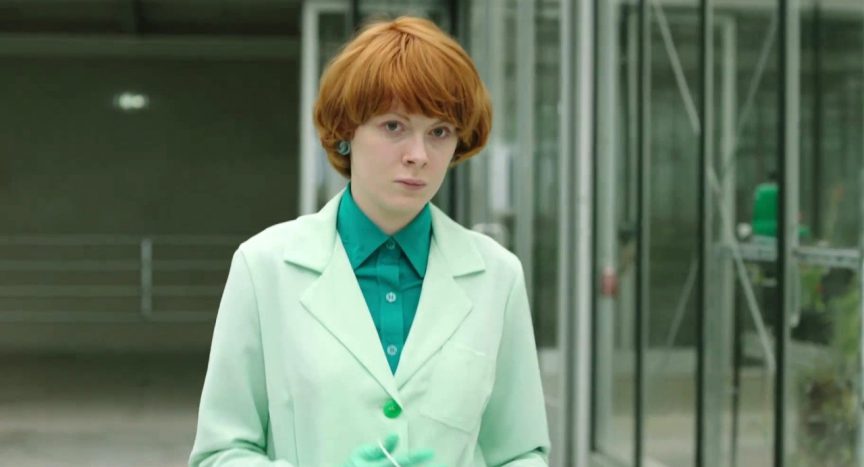Would you rather be happy or yourself? Jessica Hausner’s Little Joe asks viewers to ponder that, and other philosophical questions. What defines the self? How much of what you do is by choice, and how much of it is rote actions, a routine that you can’t break out of?
The film is centered around the eponymous Little Joe, a flower Alice (Emily Beecham) genetically engineered to produce a scent that makes people happy. As the flower grows in rows in a lab, it sprays a pollen in its greenhouse that kills the other flowers in the room. Alice’s boss, Karl (David Wilmot), sets a face-masks-on policy until they get the results of allergy tests with the pollen. Unfortunately, Bella’s (Kerry Fox) dog Bello, breaks the policy when he sneaks into the lab.
Bello—from a long line of movie dogs that is content to simply wait on a mat outside the lab for hours a day while my non-movie dog humped her bed, chewed a bone, napped, stole a tuna can from the recycling, then napped again during the less than two hour runtime of the movie—breathes in the pollen. When Chris (Ben Winshaw) checks the lab for him, the dog rips Chris’s facemask off.
When Bella is reunited with Bello, she insists, “That is not my dog.” Chris tells Alice that Bella has missed a year of work with mental illness, and that, “With the medication, she’s just not the person she used to be.” Chris isn’t either. Alice needs to decide who to believe as Chris and Alice tell her different things about what Little Joe is doing.
To complicate matters, Alice stole a Little Joe from the lab for her son, who is also named Joe (Kit Connor). Their relationship was strained to begin with, and he’s considering moving in with his father, her ex-husband. She’d love more time to dedicate to her work, but she loves her son too.
The pacing of Little Joe is somewhere between deliberate and slow. One of the struggles for genre fans is what Adrean Messmer calls “The Werewolf Problem.” Many of us have seen Frankenstein (I’ve seen untold versions), The Invasion of the Body Snatchers (both versions, thankfully) and The Happening (fortunately, I dodged this one). While Alice goes back and forth, mulling over what to do—if anything—the audience knows that the plant is getting into people’s heads. The dog’s behavior did change. So has Joe’s. And Chris’s. All after the camera has dutifully documented them breathing in the pollen.
Related: 10 Alien Movies You Should See (Besides Alien)
The behavioral changes actually aren’t all that different though. Chris has lost his affect, but he wasn’t exactly going over-the-top with charisma before that. Winshaw plays Chris as understated the entire film. The understatement is just more so after he’s pollinated. The miniscule change makes it harder for Alice to make her case. It also makes it harder for viewers to stay interested.
Beecham’s performance is similarly subdued. She communicates her inner-turmoil well enough to earn her Best Actress as the Festival de Cannes.
There is a high-pitched keening in many of the scenes in Little Joe. It’s unclear whether the noise is something the characters in the films are hearing, some part of the ventilation system in their greenhouses, or part of the soundtrack. It’s clear that is obnoxious. It feels like an acknowledgement that the story isn’t enough to hold viewers, but physically maiming their ears might keep them awake. Stranger still, in the “Q&A Session With Actress Emily Beecham and Director Jessica Hausner” featurette, Hausner says that the music was composed 20 years ago and the film was set to it.
Also See: Ten Warning Signs You Probably Missed in Get Out
Despite the tone deafening music, the film is beautifully shot. The labs are well-built and believable. Cinematographer Martin Gschlacht does beautiful work fading the red of Little Joe in the background of shots. He melts other colors on walls, behind characters beautifully as well. His close-ups of the flower blooming and retracting are gorgeous, though they may not carry the dread they were intended to.
My worry is Little Joe is an allegorical stand-in for antidepressants or SSRIs. There’s a stigma around these and other mood changing drugs already, with users (or more importantly people who need them, but won’t use them) fearing that the drugs will tamp down their personalities. Hausner and her co-writer Géraldine Bajard seem to be getting at the question of personality versus happiness, but why does it need to be a choice?
Hausner dodged a question about the topic of SSRIs from a fan in the “Q&A Session With Actress Emily Beecham and Director Jessica Hausner,” and her silence speaks louder than any words could have. In that same featurette, she insists that the film’s ending is a happy one, but it’s not something that came across to this viewer.
The “Q&A Session With Actress Emily Beecham and Director Jessica Hausner” is twenty-one minutes long, and is fascinating. Hausner is well-spoken, and the majority of the questions offer insightful readings of the film.
Wicked Rating – 5/10
Director: Jessica Hausner
Writers: Géraldine Bajard and Jessica Hausner
Stars: Emily Beecham, Kerry Fox, Ben Winshaw, Kit Connor
Release Date: March 10, 2020 (DVD)
Studio/Production Company: Coop99 Filmproduktion, The Bureau
Language: English
Runtime: 105-minutes
Subgenre: Sci-fi
Follow us on social media: Twitter, Facebook, Instagram, and Youtube
